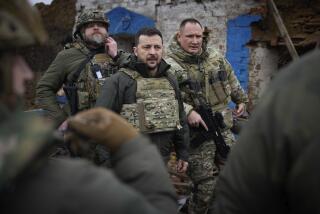Fired Army Chief Vows to Challenge Dismissal
- Share via
BELGRADE, Yugoslavia — Army Chief of Staff Gen. Nebojsa Pavkovic, who was appointed by former President Slobodan Milosevic but then played an important role in his mentor’s downfall, refused Monday to accept dismissal, raising fears of army involvement in an ongoing political power struggle.
President Vojislav Kostunica issued a decree Monday “ending the professional military service” of Pavkovic.
“I will use all legal means to challenge the decision of the president,” Pavkovic said at an evening news conference. He urged parliament to resolve the dispute.
Pavkovic also began discussing Kostunica’s action with an unknown number of top generals at army headquarters shortly after the news conference, and he was still with them well after midnight.
Kostunica, in state-run television remarks, said he fired Pavkovic “for the sake of civilian control and for the sake of democracy.” The president, one of three members of Yugoslavia’s Supreme Defense Council, said he planned to meet with top generals today.
The power struggle also involves Kostunica’s key rival, Serbian Prime Minister Zoran Djindjic. Serbia is Yugoslavia’s dominant republic, and an increasingly bitter rivalry between the nationalistic Kostunica and pragmatic Djindjic--allies in the October 2000 overthrow of Milosevic--is the focus of the country’s politics.
As a Milosevic appointee, Pavkovic’s continuation in his army post has been a major barrier to better relations between the West and Yugoslavia, so reformers such as Djindjic could be expected to welcome his dismissal. But in recent months Pavkovic has sided with Djindjic and played an important role in limiting efforts by the popular Kostunica.
“Regardless how big were the merits of Gen. Pavkovic during the [NATO] aggression in 1999, at the moment both the army and the state need other skills,” Kostunica said. “I regret that Gen. Pavkovic decided to leave in a way that is so much unlike that of a soldier, that he thought he is above the army and the army is above the state.”
Kostunica “decided that my service ends as of tomorrow, as if I were the greatest scum in this country,” Pavkovic told state television earlier. “I am not going to carry out such an order.”
Djindjic, also in televised remarks, called the clash between Kostunica and Pavkovic “a scandal on the highest state level.”
“What is happening at the moment does not benefit the international reputation of the country, and for sure does not contribute to the internal stability that we need in order to deal with what is most important, and that is the economy,” Djindjic said. Kostunica will “bear responsibility for the consequences of his decision,” he added.
At a meeting Monday of the Supreme Defense Council, the two members more closely tied to Djindjic refused to vote for Pavkovic’s dismissal unless other generals, more feared by reformers, were also dismissed, Serbian media reported.
Reformers centered around Djindjic are particularly concerned by Kostunica’s closeness to Gen. Aco Tomic, the head of Yugoslav army intelligence.
Yugoslav Foreign Minister Goran Svilanovic, a key reformer, said it was good that Pavkovic had been dismissed. “I hope there will be more changes in the army and that this is just the beginning of the reforms,” Svilanovic said.
Appointments to positions such as army chief of staff are controlled by majority vote of the defense council, which also includes Milo Djukanovic, the president of Montenegro, the smaller republic in Yugoslavia, and Serbian President Milan Milutinovic.
Kostunica said that Gen. Branko Krga, Pavkovic’s deputy, would take over the functions of the chief of staff. But in apparent recognition of legal doubts about his authority to make personnel changes without approval of the defense council, he did not formally appoint him to that post.
Pavkovic led Yugoslav army forces in Kosovo during the country’s 1999 confrontation with NATO. But the next year, after Milosevic refused to acknowledge an electoral defeat, Pavkovic threw his weight to reformers by refusing to use force to prevent protesters from overthrowing the strongman.
Pavkovic charged at his news conference that Kostunica’s action was “personal revenge” taken because he had resisted efforts by the president to use the army, “especially the security department led by Gen. Tomic,” to gather intelligence for his own political party’s use.
Pavkovic also claimed that last year he refused instructions that the army “storm” a Serbian government office that Kostunica believed was eavesdropping on him.
“The main message [was] that there is a center for bugging ... ,that because of that the security of the state is in danger,” Pavkovic said. He said he replied that “this is not the army’s job, we have no data on what’s going on there and I do not want to take part in that.”
Times staff writer Holley reported from Rome and special correspondent Cirjakovic from Belgrade.
More to Read
Sign up for Essential California
The most important California stories and recommendations in your inbox every morning.
You may occasionally receive promotional content from the Los Angeles Times.










